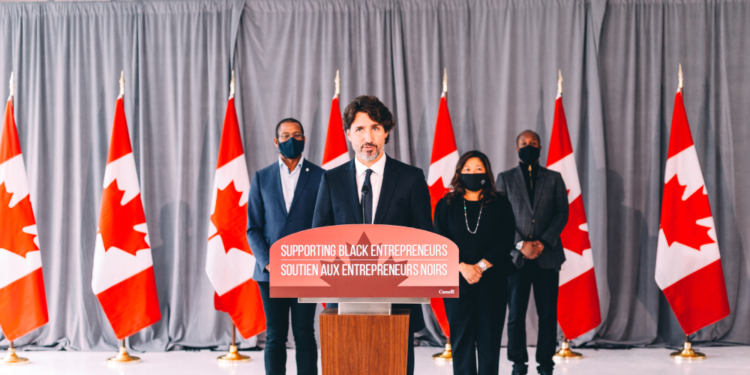Since taking office in 2015, Prime Minister Justin Trudeau has positioned diversity and inclusion as central pillars of his administration. This focus has translated into several key initiatives to address systemic barriers faced by Black entrepreneurs, youth, and communities. With the launch of the Black Entrepreneurship Program (BEP) in 2020 and targeted investments under the 2024 Fall Economic Statement, Trudeau’s government has attempted to create pathways for economic empowerment and community development.
Before Trudeau’s tenure, the entrepreneurial landscape for Black Canadians was characterized by systemic challenges, including limited access to capital, mentorship, and representation in key industries. Today, through significant government investments and community-driven partnerships, progress is evident, but substantial disparities remain. This article delves into Trudeau’s legacy, highlighting the gains made, ongoing challenges, and opportunities presented by new initiatives.
Pre-Trudeau Era: The Landscape for Black Entrepreneurs
Before 2015, systemic barriers hindered Black entrepreneurs across Canada:
- Limited Access to Capital: Black entrepreneurs faced significant challenges securing loans or funding from traditional financial institutions.
- Sparse Representation: Black-owned businesses were underrepresented in Canada’s entrepreneurial ecosystem.
- Lack of Data: Policymakers lacked detailed information on the challenges faced by Black entrepreneurs, limiting the development of targeted solutions.
As a result, many Black entrepreneurs relied heavily on personal savings to fund their ventures, and opportunities for growth were stifled.
Trudeau’s Key Initiatives: Progress Since 2015
1. Black Entrepreneurship Program (BEP)
Launched in 2020, the BEP represents a historic $265 million partnership between the government, Black-led organizations, and financial institutions. Key components include:
- Black Entrepreneurship Loan Fund: Provides loans of up to $250,000 to Black entrepreneurs.
- National Ecosystem Fund: Allocates $53 million to Black-led organizations to offer mentorship, training, and networking opportunities.
- Black Entrepreneurship Knowledge Hub: Invests $6.5 million in research to better understand the barriers faced by Black entrepreneurs.
2. Supporting Black Canadian Communities Initiative (SBCCI)
This initiative strengthens Black-led organizations by funding programs that address systemic inequities and provide community services.
3. Representation and Leadership
Trudeau’s government has prioritized appointing Black leaders to key policymaking roles, ensuring diverse voices are included in crafting policies that affect underrepresented communities.
Impact Assessment: Where Are We Now?
Growth in Black-Owned Businesses
- As of 2018, there were 66,880 Black-owned businesses in Canada, accounting for 2.1% of all businesses.
- Black Canadians are 1.5 times more likely to be involved in early-stage entrepreneurship than the national average.
Improved Access to Capital
- Since the launch of BEP, over $60 million in loans have been disbursed through the Black Entrepreneurship Loan Fund.
- However, gaps persist, with many entrepreneurs still relying on personal savings for growth.
Business Size and Performance
- Black-owned businesses are generally smaller than their counterparts, with 95.6% of unincorporated Black-owned businesses having fewer than one employee.
- Approximately 72% of Black entrepreneurs earn annual revenues below $50,000.
New Commitments in the 2024 Fall Economic Statement
The 2024 Fall Economic Statement introduces additional investments to support Black entrepreneurs, youth, and organizations:
1. $189 Million for Black Entrepreneurs
Starting in 2025-26, this funding will:
- Expand the Black Entrepreneurship Program.
- Provide capital, mentorship, and financial planning services.
2. $9.5 Million for Black Youth Empowerment
This two-year investment will fund programs under the Youth Employment and Skills Strategy, focusing on:
- STEM Education: Encouraging Black youth to enter high-demand fields.
- Career Development: Offering leadership training, mentorship, and internships.
3. $36 Million for Black-Led Organizations
Allocated for 2025-26, this funding will:
- Enhance the capacity of Black-led organizations.
- Support community-driven solutions to address systemic inequities.
4. Black Justice Strategy
The government has committed $77.9 million over two years to develop the Black Justice Strategy, aimed at reducing systemic discrimination and promoting equity in the justice system.
Challenges and Opportunities
Remaining Challenges
- Disparities in Business Performance: Black-owned businesses often report lower profit margins compared to White-owned businesses.
- Access to Networks: Limited professional networks continue to hinder growth and scalability.
- Underrepresentation: Despite progress, Black-owned businesses remain underrepresented, accounting for only 2.3% of all private sector enterprises.
Opportunities Created by New Investments
- Economic Empowerment: The $189 million for Black entrepreneurs provides unprecedented opportunities to secure capital and mentorship.
- Youth Inclusion: The $9.5 million investment in youth empowerment could help build a more diverse and skilled workforce.
- Stronger Communities: Funding for Black-led organizations will enable grassroots efforts to address systemic inequities and enhance service delivery.
A Data-Driven Comparison: Pre-Trudeau vs. Now
| Metric | Pre-2015 | Post-2015 (Trudeau Era) |
|---|---|---|
| Black-Owned Businesses | Data sparse, limited | ~66,880 (2018), 2.1% of total |
| Access to Capital | Minimal support | $265M through BEP + $189M new funding |
| Youth Empowerment Funding | Limited | $9.5M (2024-2026) |
| Community Organization Support | Sporadic funding | $36M for Black-led organizations |
| Representation in Data | Largely absent | Knowledge Hub established |
The Road Ahead
Under Justin Trudeau’s leadership, Canada has made historic strides in addressing systemic barriers for Black startups and communities. Programs like the BEP and the recent investments outlined in the 2024 Fall Economic Statement represent a significant commitment to equity, inclusion, and economic growth.
However, the journey is far from over. To ensure these programs deliver lasting impact, the government must:
- Continuously engage with Black entrepreneurs and communities.
- Expand access to professional networks and mentorship opportunities.
- Address persistent disparities in revenue and scalability.
With the groundwork laid by Trudeau’s administration, the potential for Black entrepreneurs and communities in Canada to thrive is unprecedented. The challenge now lies in turning these investments into transformative outcomes that contribute to a more inclusive and prosperous economy.













